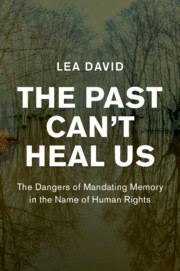Book contents
- The Past Can’t Heal Us
- Human Rights in History
- The Past Can’t Heal Us
- Copyright page
- Contents
- Acknowledgements
- Abbreviations
- 1 Introduction
- 2 Human Rights As an Ideology?
- 3 What Is Moral Remembrance?
- 4 The Institutionalisation of Moral Remembrance
- 5 The Institutionalisation of Moral Remembrance
- 6 Human Rights, Memory and Micro-Solidarity
- 7 Mandating Memory, Mandating Conflicts
- Bibliography
- Index
5 - The Institutionalisation of Moral Remembrance
Case Study of the Western Balkans
Published online by Cambridge University Press: 26 June 2020
- The Past Can’t Heal Us
- Human Rights in History
- The Past Can’t Heal Us
- Copyright page
- Contents
- Acknowledgements
- Abbreviations
- 1 Introduction
- 2 Human Rights As an Ideology?
- 3 What Is Moral Remembrance?
- 4 The Institutionalisation of Moral Remembrance
- 5 The Institutionalisation of Moral Remembrance
- 6 Human Rights, Memory and Micro-Solidarity
- 7 Mandating Memory, Mandating Conflicts
- Bibliography
- Index
Summary
The fifth chapter elaborates how and why, in the Western Balkans – and more specifically in Serbia, Croatia and Bosnia-Herzegovina (BiH) –pressure imposed by the international community (and the EU in particular) was a given from the very beginning. Following the wars of the 1990s, these countries all formally committed to the Europeanisation process. Each state's entrance into the EU was supposedly conditioned upon, among other things, facing its criminal past of human rights abuses. The main request made to Croatia, Serbia and BiH by the EU was cooperation with the International Criminal Tribunal for Yugoslavia (ICTY). In the cases of Croatia, Serbia and BiH, the post-conflict institutionalisation of human rights, as defined and enforced by EU bodies and institutions, created several mechanisms, different in their purposes and efficiency, to implement and impact memorialisation processes and practices. Addressing the post-Yugoslav, post-socialist and post-war legacies, together with the Europeanisation process, this chapter discloses the ways in which the memorialisation agenda in the Western Balkans has been shaped, and the tensions between the human rights and nationalist-centred memorialisation processes embedded in this agenda.
Keywords
- Type
- Chapter
- Information
- The Past Can't Heal UsThe Dangers of Mandating Memory in the Name of Human Rights, pp. 95 - 123Publisher: Cambridge University PressPrint publication year: 2020



